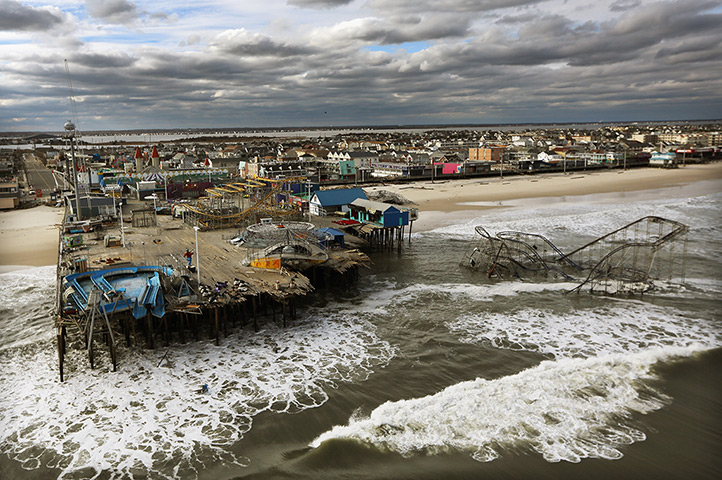Live in Texas, Florida or the Northeast long enough, and you are bound to experience a hurricane.
Or in our case, several.
The high winds and falling limbs are frightening and the loss of power and air conditioning uncomfortable.
But these hurricanes, the ones you and I have lived through, are most simply stated:
inconvenient.
When Irene hit last year, it brought with it extensive rains to an already over saturated August. And there was flooding. Lots and lots of flooding.
Water destroying basements and sweltering temperatures disturbing sleep.
Irene was an inconvenient frustration.
But then came Sandy, a storm too intense to settle as an inconvenience and far more furious than a frustration.
I was in Atlanta showing off Eden to the family when Sandy engulfed the East in her rage. I may have missed the howling winds, but the carnage she left in her wake, that is inescapable.
To put her into perspective, an excerpt from CNN:
It broke records, and it broke hearts.
More than 8 million people lost power, the result of wind, flooding and heavy snow. New York City's intricate subway system suffered the most extensive damage in its 108-year history. The New York Stock Exchange closed for two consecutive days, the first time that had happened because of weather since 1888. The surf in New York Harbor reached a record 32.5 feet -- 6.5 feet taller than a wave spawned by Hurricane Irene. A record high water level also was set at Battery Park in Manhattan, where the surge peaked at 13.88 feet.
Damage estimates put the cost of the storm around $50 billion, the second costliest storm in history, behind Hurricane Katrina.
At least 23 states felt the effects of Sandy, which morphed from a hurricane into a wintry superstorm stretching nearly 600 miles. Sandy was so big, forecasters said, that if it had been a country it would have ranked as the 20th-largest in the world.
It killed at least 111 people in the United States.
The destruction came in all forms: Wind, water, snow and fire.
Sandy was the largest storm ever recorded in the Atlantic Ocean, and the second largest in recorded history. Recovery will be long, and for so many, impossible.
On a local scale, we were spared the most horrific sites. But downed trees, crushed homes and vehicles, and lack of power are rampant. We are on day 7 without electricity. Gas stations are powerless, and those able to pump are rationing to lines over 3 hours long.
I went to the grocery store to find some food we could cook on the grill last night. I left with the last two potatoes, a gallon of milk and a loaf of stale bread. The shelves were sparse, and nearly all refrigerated/frozen goods had spoiled.
Mass transportation experienced catastrophic damage.
The train Allen takes into work will most likely not be back in working order for several months. MONTHS. Only the Lincoln Tunnel is open for travel into New York, and cars must be carrying at least three passengers to enter. And commuters are still spending over 4 hours to cross the border.
Monday he will need to find a way to work. To find a semblance of normalcy.
The children, however, will remain home, tallying the sixth day of canceled school.
Our nights are falling below freezing and our days barely warming, adding a new level of fear and fragility.
Due to the storm, my 48 hour jaunt to Atlanta turned into a week long vacation. Thursday I was finally able to fly. The drive home from the airport was eerily dark, but when I walked in my front door, I felt light: my home was happy. I have been so impressed by Allen and the children and their ability to cope without an oven, without electricity, without routine. They have all been troopers. Smiling, happy, patient troopers.
The generator has provided warmth and light, and so, we have little room to complain. We are simply suffering the inconveniences of a hurricane.
And I am so grateful.
Allen and Ryder, along with our ward, have spent nearly every waking hour hoisting chainsaws and helping our neighbors chop. Their service has truly been a beautiful thing in the wake of such ugly terror. Amidst the dark streets, these Happy-to Help Mormon hands have provided light and warmth in the hearts of so many. What an amazing gospel we are apart of. A gospel of preparedness. A gospel of love. A gospel of confidence and endurance. A gospel of hope in spite of tragedy.
Without gas and without power and with an icy chill, there is a thick level of tension.
When will this be over? When will things start looking normal? Feeling normal?
Likely the answer is not anytime soon.
And so, we will continue to endure the discomfort of Sandy.
We will find creative ways to fill our bellies and spend our days. And we won't complain.
Because while Sandy has inconvenienced and disrupted us, she did not damage or destroy us.
And that is a sentiment far too many are unable to share.
























































.jpg)